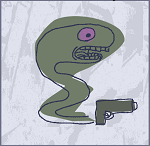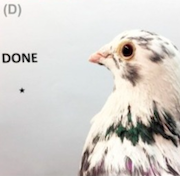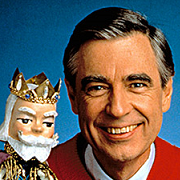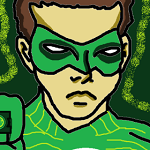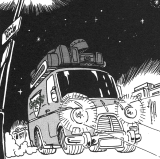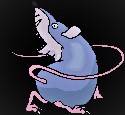|
Excuse me, Tungyn, are there any parts of this book that deal with the "battle of the sexes"? I think that would be a great subject matter to turn your creative wit towards.
|
|
|
|

|
| # ? Apr 27, 2024 07:01 |
|
Tequila Bob--Yes, Claude.ai helped me in some of the construction of the Press Release and that is part of marketing. it was an oversight not to mention that and I stand corrected.
|
|
|
|
Gertrude, there are insights he shares about how escapism plays out differently between the sexes. For instance, men might have trouble relating to paranormal romance novels which provide women with a sense of escapism from the reality of modern existence. Men might prefer football as a place to escape and some women have trouble relating to that. There is a scene at his place of work where a coworker is using her feminine wiles in the worst possible way.
|
|
|
|
Addendum to my answer to Tequila Bob: AI has also been helpful in suggesting marketing opportunities and target audiences. Here are the sorts of things I'm talking about: Counterculture and alternative lifestyle enthusiasts: Those who identify with counterculture movements or embrace alternative lifestyles may resonate with the book's rejection of societal norms and expectations. Fans of absurdist fiction: Readers who enjoy the works of authors like Kurt Vonnegut, Douglas Adams, and Franz Kafka may be drawn to the book's absurdist elements and unconventional narrative style. There were many suggestions related to an overlapping demographic with people who are fans of punk and grunge music with detailed explanations why. This is using AI for research. As an aside in reference to a prior comment--the entire novel was professionally edited at considerable cost.
|
|
|
|
Tungyn Cheque posted:As an aside in reference to a prior comment--the entire novel was professionally edited at considerable cost.
|
|
|
|
Tungyn Cheque posted:Addendum to my answer to Tequila Bob: AI has also been helpful in suggesting marketing opportunities and target audiences. Here are the sorts of things I'm talking about : punk and grunge music fans often have an 'alternative' counter-cultures bent which might interface productively with the left-field insights your book provides (probably, I haven't read it)
|
|
|
|
Tungyn Cheque posted:There is a scene at his place of work where a coworker is using her feminine wiles in the worst possible way. Please share an excerpt of this 
|
|
|
|
I am not a nihilist (I believe in the value of human life, love, etc.). Can I still enjoy this novel?
|
|
|
|
Tungyn Cheque posted:Gertrude, there are insights he shares about how escapism plays out differently between the sexes. For instance, men might have trouble relating to paranormal romance novels which provide women with a sense of escapism from the reality of modern existence. Men might prefer football as a place to escape and some women have trouble relating to that. This is setting off my sexism detector in a big way. These are some outdated-rear end stereotypes. Tungyn Cheque posted:There is a scene at his place of work where a coworker is using her feminine wiles in the worst possible way.
|
|
|
|
real talk I think you have written an entire book mistaking nihilism for cynicism
|
|
|
|
Dare one ask what Rectum Leviticus does for a living?
|
|
|
|
Antivehicular posted:Dare one ask what Rectum Leviticus does for a living? IT of course, where he has to interact with clueless office drones who just don't 'get' his brand of zany genius.
|
|
|
|
Tungyn Cheque posted:There is a distinct anti-establishment, counterculture vibe to the main character, Rectum Leviticus, and I think he will resonate with folks here on SA. Tungyn Cheque posted:I'm not posting dating-related quotes or further excerpts as the pinata reception from this forum doesn't vibe with the spirit of the book or the author. ????????
|
|
|
|
Im struggling to understand why you would get an AI to market your book for you
|
|
|
|
Absolute hand-to-heart serious post: TC, I will write you a detailed critique of the grocery-store excerpt if you want it. I have some thoughts.
|
|
|
|
Mel Mudkiper posted:Im struggling to understand why you would get an AI to market your book for you Its all part of the counterculture vibe man, squares like you just dont get it.
|
|
|
|
Antivehicular posted:Absolute hand-to-heart serious post: TC, I will write you a detailed critique of the grocery-store excerpt if you want it. I have some thoughts. Please do it anti v I'm asking on behalf of this website
|
|
|
|
quote:WARNING: If you're easily offended, or cling desperately to the illusion of meaning, this book is NOT for you. But if you're ready to laugh at the chaos, question societal norms, and embrace the joyful futility of it all, this book will become your new survival bible. Plz read with care goons
|
|
|
|
Antivehicular posted:Absolute hand-to-heart serious post: TC, I will write you a detailed critique of the grocery-store excerpt if you want it. I have some thoughts. Please do this! Note that the entire chapter is available, via the author, at this Google Drive.
|
|
|
|
At first I thought you guys were tilting at windmills calling it AI but now I am skeptical a word of it was actually written by this dude. The cover, ad copy, reviews were all AI but somehow the hard part of actually writing wasnt?
|
|
|
|
Mel Mudkiper posted:At first I thought you guys were tilting at windmills calling it AI but now I am skeptical a word of it was actually written by this dude. quote:The reverie only broke as his turn came to check out. He looked at his receipt amazed at classic quippage, no computer wrote that
|
|
|
|
Tungyn Cheque posted:His final stop prior to exiting always brought stares of disbelief from fellow shoppers. Those entering and sanitizing their shopping cart handles with antibacterial wipes, made available in homage to collective mysophobia, and those exiting in a hasty and harried rush to their next task, all paused to watch R. L. as he ripped off the unnecessary cardboard boxes and other assorted packaging and threw them away. Bare and naked essentials fit better in his backpack and in his limited cabinet space at home. This passage in particular, I struggle with what the author/ai is describing. Everyone stops to stare in disbelief because Rectum is, opening packages and putting foodstuffs in his backpack? Like is he pouring a box of cereal in there and throwing the box on the ground? Ripping raw meat out of the package and throwing it in his backpack? What else would be so shocking?
|
|
|
|
it's not AI. AI prose is very distinctive and it does a lot of summarising and, like, weird foretelling in paragraphs that no human writer would do. the copy, editorial, and at least one of the reviews read to me like AI, though.
|
|
|
|
AcidCat posted:This passage in particular, I struggle with what the author/ai is describing. Everyone stops to stare in disbelief because Rectum is, opening packages and putting foodstuffs in his backpack? Like is he pouring a box of cereal in there and throwing the box on the ground? Ripping raw meat out of the package and throwing it in his backpack? What else would be so shocking? Yeah, I'm stuck on this too. I feel like there are two options here: 1) Removing superfluous outer packaging material so stuff fits in his backpack better (sensible, would not draw the slightest notice of anyone else as long as he's not standing in the middle of traffic or throwing cardboard everywhere) 2) Depackaging everything completely, shoving raw meat in his backpack, wtfever (would draw notice because what the gently caress?)
|
|
|
|
Ctrl f "normies"
|
|
|
|
hey OP I just wanted to say I appreciate how hard you're working to reintegrate into modern society after waking from a coma after a 2009 car crash, keep at it bud
|
|
|
|
the author seems to have a very strange idea of what is interesting. He focuses on a condom in the checkout lane for a paragraph and thinks people would be shocked at someone removing boxes so groceries fit better?
|
|
|
|
Sneak preview of coming review: I am not certain the author has been in a grocery store lately, possibly ever
|
|
|
|
I showed this to my author friend and he bought a copy and is hate reading me excerpts
|
|
|
|
Antivehicular posted:Sneak preview of coming review: I am not certain the author has been in a grocery store lately, possibly ever It's pointless to visit them when you have already conquered them intellectually. RL groks groceries harder than a solipsist in a self-service checkout.
|
|
|
|
Mel Mudkiper posted:I showed this to my author friend and he bought a copy and is hate reading me excerpts Is it true that one of Rectum's female coworkers uses her "feminine wiles" in the "worst possible way"? And is there anything about the scene to suggest that Rectum and/or Cheque are not as sexist as his previous post suggests?
|
|
|
|
I skimmed the Amazon preview and the story opens by explaining that the man is named Rectum because they misspelled "Rector" on his birth certificate. I hate to say it but I just don't find that scenario at all plausible. That said, I think I need to read chapter 12, titled "Weird Stuff", before I can form a genuine opinion.
|
|
|
|
The author has read other books, Shakespeare and the poems you have to read at school, and is very anxious that the reader should know it.
|
|
|
|
The AI generated marketing is amazingly terrible. Here are a few of the suggested interview questions for someone interviewing the author:robot slurry posted:The philosophy of nihilism has same negative associations. In the book you claim Buddha was a nihilist. Can you elaborate on this? robot slurry posted:You have a lot of literary references throughout the book. Are you concerned that some readers won’t pick up on them? 
Rob Filter fucked around with this message at 05:30 on Mar 22, 2024 |
|
|
|
Vox Nihili posted:I skimmed the Amazon preview and the story opens by explaining that the man is named Rectum because they misspelled "Rector" on his birth certificate. I hate to say it but I just don't find that scenario at all plausible. NGL, the mental image of a family who intended to name their child Rector, ended up with Rectum on the birth certificate, and just shrugged and said "guess that's the name now! Welcome to the world, Rectum!" is funnier than anything in the sample chapter.
|
|
|
|
Rob Filter posted:The AI generated marketing is amazingly terrible. Here are a few of the suggested interview questions for someone interviewing the author: This is like one of the images from a review he cited
|
|
|
|
All right, I'm home from work, let's take a look at Chapter 6, The Supermarket. Before I get into the detailed critique, there are two main points I want to make here: two elements that are vital for satire and that, in my opinion, this chapter does very badly. 1. Specificity. Satire, above all, needs to be sharp: as carefully observed and specific as possible, both about the world it's creating and about the world it's commenting on. There needs to be clear themes and a strong, pointed thesis. This chapter has none of these things. The initial topic is tepid and flabby on its own ("the grocery store: we buy food there! And get this -- the store wants to make money from us buying food!!"), but there's a huge lack of description and specificity throughout, and the few details that are observed go nowhere and do nothing. They're not fresh, they're not funny, they're not interesting, and they're not even particularly accurate; I can't even guess at authorial intent for most of this. There are also a few half-hearted attempts at theses, and none of them go anywhere. 2. Character. If you want to write a "protagonist struggling against an absurd or malicious world" story, the protagonist's character and voice are of critical importance. Are they a disoriented outsider, a relatable everyman, a sardonic mastermind, a buffoon? I can tell which of these R.L. (I would love to keep writing out his name, but if I do, I'm gonna go into a fugue and this is just going to turn into "RECTUM LEVITICUS, BROOKS CRACKTACLE, CHERRY VENUS" for pages and pages) is supposed to be, but in practice, he's just a cipher. We get shockingly few details of what he's doing (besides "the smart thing"), and in general everything is focused on how cool and smart he is, not who he is. This chapter fails to answer the most basic question about its protagonist for any genre of fiction: "who is this guy, and why should I care about what he's doing?" In a sample chapter! This is poison. Anyway, onto a closer reading: The first two paragraphs, taken on the whole, are worthless, just vague bloviation about how big supermarkets are and how they separate us from our roots, or something -- the first sentence is particularly bad, just archetypal "high-schooler padding out word count" stuff. If you told me an AI wrote this, I frankly wouldn't be shocked. We have a hint of a thesis here, the idea that the supermarket destroys "meaningful human interaction," but no glimpse at all of what kind of interaction R.L. wants. Does he want to be connected to the people who grow his food? (Farmer's markets exist; why is he at the supermarket?) Does he want to speak to professionals about his grocery needs? (Upscale grocery stores with expert staff exist; why isn't he going to one of those?) Does he just want to hit on cashiers? This is the first example of lack of specificity, lack of character, and weak observation of the world. It's absurd to have the narrative voice bemoan the world's insufficiency when we're given no clue what R.L. wants, what interaction need the supermarket isn't meeting (and whether that's remotely reasonable for R.L. to expect!), and what his options are. Even a casual glance at the modern shopping landscape shows that there's a world of options for food shopping these days, many of which might address R.L.'s needs and his complaints about the supermarket selection, so... why is he here? Even a basic "he can only shop at Crapmart, because he lives in a crummy small town/it's the only place within walking distance and he has no other transport/freelance work is tight and he can't afford Nicefoods right now/he gets out of work at 2 AM and Crapmart is the only place open" would go a long way towards making R.L.'s predicament here more sympathetic and towards defining him as a character. Instead, we are merely told that he enjoys this and has a "love-hate relationship" with the grocery store, which suggests that R.L. is the kind of person who does poo poo he hates because it's more fun to feel smug and superior than to take initiative for your own happiness. I suspect this is a theme. Onward to an extended jack-off session about how R.L. is very smart and marketing doesn't work on him, he does couponing, blah blah blah. What strikes me first is how absurd it is for this book to present smart shopping as some brilliant ubermensch lifehack -- R.L.'s approach is sensible, but it's also common. (You know who tends to be really good at it? People on limited incomes, whom I'm sure the rest of this book thinks are all idiot sheeple. Just a hunch.) We're already in the realm of "lifehacks" that the rest of the world would call "everyday household hints," but have to be presented as galaxy-brain stuff to convince pseudointellectuals that they're worth their time. This is also a huge missed opportunity to characterize R.L.; we're talking about his shopping habits, but all we're told is that he's "highly selective," and that he buys generics. (Once again, this is not brain genius stuff.) Is he the kind of guy who can shop on the cheap because he doesn't care much about what he eats, so he can stock up on rice, beans, and whatever protein is on sale? Does he enjoy the challenge of turning whatever's on sale into an interesting meal for himself? Are there any treats that tempt him, and does he indulge or deny himself? Who knows! We're told that he cooks for himself (once again: THIS IS NOT RARE), with the implication that he primarily cooks for himself so he can prepare food to "his own preferences instead of market research." What those preferences are, who knows, except that they're better than the sheeple's, clearly. At this point, there's a sense that the book is dodging telling us anything about R.L. except how great he is, because otherwise the reader might form their own opinion, I guess? (A digression: good satire and commentary on consumerism and material culture recognizes that a great deal can be said about how people interact with objects and commodities, what choices they make in personal consumption and expression, and that everyone at every level of consumption culture is making interesting decisions in this regard. This is where specificity shines. We're clearly not getting it here.) Now we come upon one of the first times the text chooses to give us detail: R.L. counting objects! Specifically, the concept that all the options at the supermarket are "nearly identical!" This is pretty well-trod satirical ground (although as observed above, you could write something interesting about how and why people make the choices they do and what those choices mean to them), but it's not pursued in any way besides the statement that there are many different kinds of soap and pet food. (Why is R.L. in the pet food aisle when he only owns a gecko, which he observes the store doesn't carry anything for? Is this the kind of guy who walks the aisles when he doesn't need anything? Who knows.) We get a lengthy chunk of speculation about the store carrying fewer varieties of cat food than dog food because of the need for shelf space for cat litter, as one of R.L.'s first concrete observations, and... okay? I mean, maybe? I'd have to talk to someone who does grocery store planograms, and that would be way more interesting than anything happening on the page. It's not funny, it's not absurd, it's not even interesting, it's just something R.L. saw, slapped down on the page and going nowhere. If you're going to give concrete descriptions of this little, what you do give has to hit, and this whiffs. In quick succession, as if to mock me, we get two more concrete observations that whiff: speculation about why supermarkets also sell some home goods (because a lot of people use them as a centralized shopping location? It's not like having non-food items in the supermarket make the food go bad, dude), and everyone's favorite bugbear, food additives! Here we get R.L. musing on "drinking sodium silicialuminate," which approximately thirty seconds of Googling reveals to me a} is called sodium aluminosilicate, b) is a powder anti-caking agent/desiccant added to other powders, not anything you'd drink and not a preservative, c) is not listed by its chemical name on food labels, and d) is completely safe for human consumption. Satire needs to be sharp, and if you're taking as tired an anti-intellectual bit as "boy, there are a lot of big words on this food package!", you need to do way loving better than this. If the cat-food bit is a swing and a miss, this is fouling the ball off your own groin. And now we come to the checkout line, and the first establishment that other people exist, aside from a reference to "naive" shoppers earlier. (One presumes in this universe, they're just knocking every box on the shelf into their carts like a Supermarket Sweep player in the diaper aisle, because only minds on R.L.'s caliber display behavior like "choosing less expensive products" or "buying bulk necessities.") We get a vaguely amusing anecdote about someone loving up the express lane and the person behind them being mad, which is... almost a concrete description, and actually kind of a real joke, to my immense surprise? The fuckup here (because of course this gets bobbled) is that, after starting this piece, R.L. merely watches in "bemused fascination," and then we get an aside about now that he's older and a proper nihilist, he understands how meaningless everything is, even the checkout-line rules. (Because the cashier is "oblivious" and doesn't care, of course!) There are two huge unforced errors here, to go back to the well of baseball metaphor: 1. Having R.L. reflect on how he was "a bit younger and less nihilistic," and now he's much smarter, is somehow a high-water mark of adolescent characterization even for this piece. It is 100% a 13-year-old talking about how punk they are, not like when they were 12 and a baby! Mortifying. 2. We started this piece with two insufferable paragraphs about the idea that the supermarket prevents "meaningful human interaction." This scene was an opportunity to have R.L. search that out! Even something like having him nod in commiseration to the woman stuck in line, creating a tiny moment of connection between these two strangers about a common human frustration, would have called back to that and suggested something much more interesting about R.L. than anything we've got here. Instead, he gets to keep himself above it all, Much Smarter Than You, Placid, Unbothered, Nihilistic. All I can assume about the character is that he doesn't want to connect with people, he just wants to feel superior to people; it's a characterization moment, but the character it's developing is "shithead." (Another note: isn't it interesting that the two people we see here, the stupid rule-breaking 25-item lady and the irrational angry three-item lady, are both women who exist so a man can feel calmly superior to them? I think that's very interesting! I suspect this may be a running theme!) Onto the apparent delights of the checkout aisle. We get a description of tabloids that would have been trite in 1985 and suffers once again from a lack of specificity -- no description of the headlines and what might be amusing about them, merely that it's all relationship gossip, of course! And the sheeple eat that up! (Hmm, what kind of sheeple in particular would that be? Who are checkout-aisle magazines usually marketed at? No matter. I'm just collecting data points.) R.L. being snide about the magazines being written at a "fifth-grade reading level," as if increasing the difficulty of the prose in popular journalism would serve any purpose at all, hits that right tone of smugness before the further smug observation that there are twelve different kinds of mints on the rack. (Why would there be any demand for different flavors of mint, after all?) And then... oh, look, condoms! And a stupid pun, which is at least identifiable joke-shaped content, before we get to another interminable observation of a "clever" mind. R.L.'s ruminations on the condoms being left behind is a good example of a major flaw of this text, which is assuming a situation is inherently stupid and absurd when it's no such thing. We saw it before with the cat-food shelving (not remotely absurd) and the product varieties (people have different preferences for soap scent and mint flavor, who knew?), but now we have it with the question of why someone would abandon condoms if they came up short on grocery money. Anyone with even a vague awareness of how grocery shopping works, and the slightest ability to imagine coming up short on cash at the checkout, can come up with plenty of plausible reasons: condoms are pretty expensive, they're not covered by food-assistance benefits, they're a lot easier to survive without until payday than staple groceries or toiletries... but all the mind of R.L. can conjure up is the vague idea that someone might have made that decision while looking at an utterly mundane array of groceries, with no further interest or speculation. Are we supposed to find it funny or droll that the theoretical shopper bought an issue of the Enquirer? That they bought light beer? There's more unpleasant odor of "stupid sheeple" here (this guy R.L. made up likes alcohol! And tabloids! And having sex!!), but it's not even detailed enough to get angry at, just another vague idea thrown on the pile to rot, without either R.L. or the narrative bothering to explain why this deeply ordinary situation is worthy of laughter or scorn. When you presuppose everyone and everything around you is completely stupid, you don't have to try and prove it to the reader, I guess? At last, God help us, R.L. has purchased his groceries. He's saved a lot of money, and he's very proud of how smart he is, in case we haven't intuited that element of his character yet. We're now told that he's getting "stares of disbelief" as he "rip(s) off the unnecessary cardboard boxes and other assorted packaging and thr(ows) them away." The extreme paucity of detail about what he's actually doing here, and what products he's doing it to, makes it very hard to picture this scene. Presumably, in this sort of midcentury-phantasmagoria Generic Horrible Supermarket, all products come in bulky unnecessary cardboard boxes; in the real world, most products in cardboard boxes need to be and are more conveniently carried home packaged, even for someone going with a backpack on foot. It doesn't matter, though, because we have no visual on what he's doing! Are people staring at him because he's scattering cardboard everywhere? Because he's standing in the middle of the exit blocking foot traffic? (As people leave in a "hasty and harried rush," a good example of using three words that add nothing to each other.) It makes no sense that people would stare because he's repacking his groceries to fit in his backpack and bags; people do that all the time, at least in the real world. (In this one, maybe it's another concept that only R.L., the only sapient being alive, has discovered.) I'm just picturing him peeling raw meat off the tray so he can put it in his own Tupperware, then opening his bags of chips to squish the air out and crush them into his backpack. Is this stupid? Yes, but it's exactly as textual as any mental image of R.L. doing something that makes sense. Finally, we come to "Survival Tips," which appears to be "the author tries to retell us the jokes he liked the best," and make it clear that there's nothing even remotely resembling a thesis here. We get a weird non-joke about a website, the idea that grocery shopping is still superior to hunting-gathering (not suggested or supported by the text), a repeat of the "food labels have funny words on them" joke, and a suggestion that people are gross, while the previous reference to sanitizing wipes suggested that people were stupid germophobes. So are the sanitizing wipes useful or not? I guess it doesn't matter, as long as we make it clear that everyone except R.L. is stupid! Now, with the details out of the way, I'd like to circle back to the two ideas I discussed at the beginning of the critique: specificity and character. The failure of specificity in this case comes from both the paucity of concrete detail and in the confusing choices of what to describe when detail is chosen, giving us pointless anecdotes about cat-food shelving and incorrect chemical names. The fundamental issue here is that old truism, show vs. tell: specifically, the idea that the author has decided that everything around R.L. is obviously absurd by first principles, telling us at great length how above it all R.L. is without ever showing any evidence that anything ridiculous or even unusual is happening. R.L. isn't a great wit surviving in a mad world; he's an ordinary person doing ordinary things in a rational world. (It's very conspicuous that, for a "survival guide," R.L. never seems to encounter any struggle or conflict, nor is any suggested by the text. He's not coupon-cutting because he's struggling with money, just because he's Really Very Smart; he shops at the crappy supermarket because he enjoys it, not because his options are constrained; he doesn't make any purchasing decisions he isn't smugly satisfied with. He doesn't even get caught in the checkout line behind an rear end in a top hat! That happens to someone else! If he's supposed to be just surviving, shouldn't something negative happen to him at some point?) Some of this, I suspect, is because of weak authorial observation skills, such that there isn't anything interesting to put in R.L.'s brain, but there's also a sense of self-satisfaction here that makes me think the author wasn't trying very hard. On the subject of not trying very hard: character! As I mentioned repeatedly, it's shocking how little detail we get about R.L. and his life, aside from "he does the smart thing, because he is smart, and he is bemused because he's a nihilist." We learn he cooks for himself, but we have no idea of his relationship to food except to feel smug about how much better his choices are. We learn he has a pet gecko named Mephisto, whom he envies for the "nostalgic hunter-gatherer lifestyle" (???) of an animal, although he also prefers the grocery store to hunting and gathering, I guess? (I have no idea what's going on with the hunting-gathering motif. I'm not sure anything is.) We learn by implication from the first two paragraphs that he craves human connection, and yet the only two other humans he sees he regards with silent scorn -- er, "bemusement!" -- and then he makes up a guy to be disinterested in. R.L. is a cipher, but the one thing that comes through loud and clear is that the thing he values most is his perception of superiority over other human beings, without the text ever making him remotely clever. In short, this guy is a prick, and five pages of him going to the grocery store was insufferable. Who could read an entire book of this?
|
|
|
|
Antivehicular posted:All right, I'm home from work, let's take a look at Chapter 6, The Supermarket. I mean, same
|
|
|
|
the main character sounds like he tried to combine Ignatius J Reilly with Hauden Caufield and ended up with a hot topic t shirt Also its becoming increasingly obvious the author doesnt know what nihilism is
|
|
|
|

|
| # ? Apr 27, 2024 07:01 |
|
Antivehicular posted:All right, I'm home from work, let's take a look at Chapter 6, The Supermarket. lmao Thanks for the  OP OP
|
|
|



